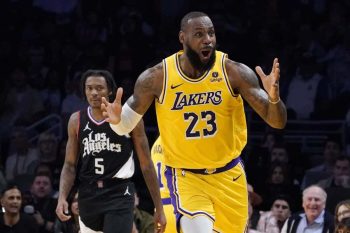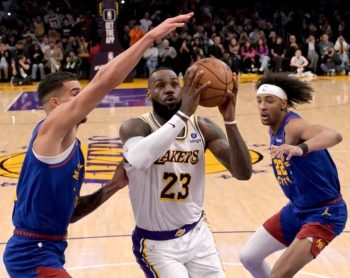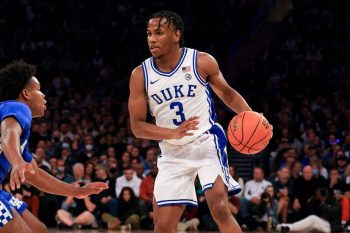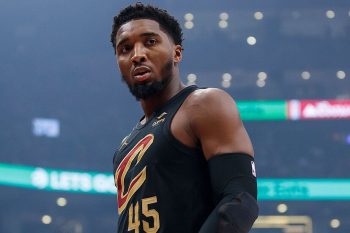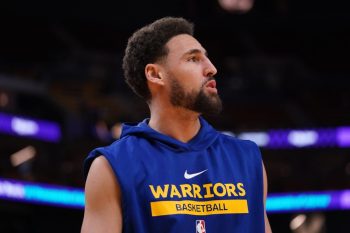NBA
Coming to America: How International Players Survived in NBA

Each year, a growing number of international athletes come to the United States to pursue a career in the NBA.
The 2014-15 NBA season kicked off with a record-setting 101 international players from 37 countries and territories on opening night rosters. This number has more than doubled from 45 international players during the 2000-01 season.
During All-Star Weekend, the format of the BBVA Compass Rising Stars Challenge has changed from all rookies vs. sophomores to a United States vs. World competition. The All-Star team also features international players including Marc and Pau Gasol, the first two Europeans voted in as starters by fans.
The transition of international players is judged by how they perform on the court, but their real challenges are encountered away from the game. From language barriers to cultural differences to living alone in a new country to trying to fit into a new environment, their learning curve goes far beyond basketball.
Each athlete has a unique experience chasing their basketball dreams. We spoke to 17 players from 14 countries about their journey and adjustment to the NBA.
Pau Gasol, Spain
Pau Gasol is one of the longest-tenured international players in the NBA. Now in his 14th season, it seems like ages ago that he struggled to get acclimated to the league when he was drafted third overall in 2001.
“It was hard at first because it’s part of the process,” Gasol said. “My English was not that good at the time. I could get by, but I was not comfortable speaking the language and really understanding everything.”
Gasol, who made his debut at 21 for the Memphis Grizzlies, chose not to take English classes. Instead, he tuned into movies with subtitles. He also watched the television shows “Friends” and “Sanford and Son” with then-teammate Stromile Swift. Over time, he became more comfortable.
“You have to be patient,” Gasol advised. “You’ve got to be willing to make mistakes and embarrass yourself. It’s part of the learning curve.”
Anderson Varejao, Brazil
Anderson Varejao has been a mainstay in the city of Cleveland for the past 11 years. Back in 2004, he had no way of envisioning he would establish himself in a place he came to with so much uncertainty.
Varejao grew up in Brazil and moved to Spain at age 16 to play basketball. The experience prepared him to live abroad, although neither location was much like Cleveland. He was used to warm weather and a large Brazilian community that shared his culture. Being without either was a hard adjustment at first.
Although Varejao spoke Portuguese and Spanish, he didn’t know English. After three classes that didn’t pan out, he turned to a Cavaliers assistant trainer who spoke Spanish for help. One area where Varejao had trouble was ironing out phrases that had the same meaning but were expressed differently. For example, being greeted with “What’s going on?” instead of “How are you?” was challenging at first.
Over time, the one-on-one guidance from the trainer combined with months spent with his teammates taught him his third language.
“I was ready for that; I knew it was going to be tough,” Varejao said. “Little by little I learned English. I’m still learning English (laughs).”
Once Varejao adapted to his new surroundings, he faced the question as to how long he would be there. He had signed a multi-year deal, but still wondered about the longevity of his career. More than 10 years later, it looks like he didn’t have to worry.
“The best part (of coming to the United States) is that I’m an NBA player,” Varejao said. “It’s the best basketball in the world and I’m happy to be part of that. When I got here, I didn’t know how long I was going to be there. I’m just happy that I made it.”
Mirza Teletovic, Bosnia
Mirza Teletovic was in the beginning of his rookie NBA season when Hurricane Sandy struck the East Coast in 2012. In an instant, the Brooklyn Nets forward had to figure out how to navigate an unfamiliar city in an even more unfamiliar situation.
“Everything kind of stopped,” Teletovic said. “Our practice facility was flooded. I lived in New Jersey and I had to drive from there to Brooklyn every day for three months. I woke up every morning around 5 to get to practice at 9 or 10. I had to leave early because you never know how the traffic is going to be. It was really tough.”
Once he settled into the swing of the season, he encountered challenges adjusting to the time difference. He grew up in Bosnia and played six years in Spain before joining the Nets. Evening in the United States felt like the middle of the night in Europe. He picked up a new pregame regimen as a result.
“I started drinking coffee,” he said. “I didn’t drink it before, but we start the game at 7:30 p.m. and it’s 1:30 a.m. back home. You kind of get sleepy. I drink it before every game, it’s kind of routine. I always take a latte. Here I like white chocolate mocha from Starbucks.”
Even though Teletovic learned English in school growing up, he was faced with new basketball vocabulary in the NBA. He estimates it took him two or three months to pick it up, a process he described as “really tough.”
“I think it’s really important to realize once you come to the United States,” he said, “it’s a big change in your life.”
Marcin Gortat, Poland
In order for Marcin Gortat to succeed in the NBA, he knew his toughness had to extend beyond the court. Moving to the United States, understanding a new system and spending time away from friends and family would be a test of his mental strength, one that he came ready to tackle.
“It’s just not easy,” Gortat said. “You have to be tough mentally. You have to have the right people around you and you need to have the right organization that is going to provide you with a lot of different things to help you.”
Gortat had a firm understanding of English when he joined the Orlando Magic in 2007. He admits he was one of the worst students in his English class growing up, prompting his mother to hire a tutor, which helped him earn top marks. He left Poland to play basketball in Germany at 18. Since he spoke more English than German, he became friends with the Americans on the team and enhanced his language skills.
He remembers having to learn “everything from a basketball standpoint through life” once he arrived. He credits his coaches and veteran teammates on the Magic as well as his mentors for easing the transition.
“I believe those people helped me to survive,” Gortat said.
Gortat encourages other international players to dive into the English language and not be afraid to laugh at themselves if they misuse a word. He remembers when he would mix up a sentence and people teased him, he laughed it off whereas others may close up and become hesitant to speak.
“I believe the first thing for an international player if he wants to succeed in the NBA is, you have to be able to speak in English and have a conversation with (your) teammates,” Gortat said. “I think there are a lot of talented players from Europe that stayed in the NBA for just a year or two because they couldn’t communicate with his teammates.”
Eight years later, Gortat’s mental toughness has helped him experience a lot of success.
Al Horford, Dominican Republic
Al Horford put his plans for the NBA in motion earlier than most. Horford grew up in the Dominican Republic with his mother while his father, former NBA player Tito, lived in the United States. He and his family decided Horford should move in with his father in Michigan and play high school basketball in the U.S. to improve his chances of a college scholarship.
“It was a huge help,” said Horford, who won back-to-back NCAA championships at the University of Florida. “I was very lucky. A lot of people don’t have family here or they have to do it a different way.”
Spending his teenage years in the United States allowed Horford to adjust to a new culture and learn English, which he spoke very little of when he moved. By the time he was drafted by the Atlanta Hawks in 2007, the transition to the pros was dramatically easier than if he had stayed in the Dominican Republic.
“I would say coming here (as a teenager) is an advantage, especially going to college and developing,” Horford said. “If not, you’re looking at maybe going to Europe and it would be a longer road to get here. I would recommend it, definitely.”
Andrea Bargnani, Italy
Unlike most players, Andrea Bargnani did not live in the United States when he came to the NBA. He was drafted first overall by the Toronto Raptors in 2006 and his league experiences began in Canada.
“I think I was pretty lucky because I went to Toronto,” Bargnani said. “Toronto’s a very metropolis, international city. You’ve got people from everywhere. There is a huge Italian community, so it wasn’t really a big transition. I was comfortable almost right away.”
Bargnani spoke “just a little” English as a rookie. He watched Italian movies with English subtitles as a starting point. He moved on to English movies with Italian subtitles, until eventually he watched them only in English.
He also picked up favorite phrases along the way.
“The English word I use the most is, ‘What’s up?’” he said. “Coming from Italy, that’s the one I didn’t know that people say every day. In Italy we say, ‘Come va?’”
Ricky Rubio, Spain
When Ricky Rubio came to the NBA, his job was to run the floor for the Minnesota Timberwolves. He had basketball down. The problem was, the point guard from Spain had trouble calling his plays.
“I spoke English but not perfectly,” Rubio said in Spanish. “That influenced the communication on the court. It was like an obstacle little by little I got over.”
Rubio became more comfortable by talking with his teammates on the bench and away from the game. While he had an English teacher his first year, he found the casual conversations to be more helpful.
Four seasons into his NBA playing career, he is at ease on the floor and remembers how far he came to get there.
“You’re going to another country with another language that you can’t understand and you can’t express 100 percent how you feel,” said Rubio. “It’s hard in the beginning when you’re by yourself out there, and then it gets easy when you have good teammates that help you.”
Gorgui Dieng, Senegal
Gorgui Dieng began his NBA pursuits as a teenager when he left Senegal for Huntington Prep School in West Virginia. The flight to the United States presented its own set of challenges — Dieng did not speak English and had to navigate his way through a layover with the help of airline attendants.
Once with his host family, he struggled being away from his own. Not only did he miss his relatives, he also yearned for the traditions he had grown up with, particularly when it came time to eat.
“People have family meals back home,” Dieng said. “They make time for it, have lunch, breakfast, dinner. The (family values) are different.”
Over time, Dieng became comfortable in his new settings. He now views those he lived with in a special regard.
“When you come here, they take care of you,” he said. “They helped me and that’s like your family.”
Patty Mills, Australia
Often times, learning English can be the biggest hurdle for an international player. Patty Mills, who grew up in Australia, encountered challenges with the same language.
“There’s still a language barrier,” he said. “There are a lot of things that we say differently.”
Mills attended college in the United States at Saint Mary’s College of California, viewing the move to the West Coast as a better pathway to the NBA. His accent, pronunciation and terminology made it difficult at times to communicate.
“‘Ketchup’ for example — we don’t call it ‘ketchup,’ we call it ‘tomato sauce,’” Mills said. “If you say tomato sauce to someone, first of all they don’t understand your accent so they don’t know what you’re saying. Even when you say ‘tomato,’ they can’t quite understand you. Although it’s English, there are a lot of things that you still struggle to understand.”
Mills had teammates from Australia on his college basketball team and they stuck together to navigate the cultural changes they encountered.
“It’s winter here for Christmas and Christmas in Australia is summer,” he said. “The food you eat for Christmas and Thanksgiving is different than home. We would have a cold seafood dinner compared to a hot dinner.”
Even though Mills has adapted to the U.S. lifestyle, he hasn’t lost his Australian accent. If someone has trouble figuring out what he is saying, he will continue to repeat it instead of changing his pronunciation.
“That’s just me remembering where I’m from,” he said, pausing and smiling. “I think at the end of the day it’s more fun to see if they understood what I was saying.”
Dennis Schroder, Germany
Dennis Schroder brought a piece of home with him when he moved from Germany to Atlanta last year. His older sister, Awa Secka, lived with him during his rookie season, adding a sense of comfort in a new environment.
“It helped me a lot,” Schroder said. “She did everything off the court for me. Every time I came home from practice, the food was done, she cleaned everything, washed everything. When I came back home I didn’t have to do anything and just rested. It was great for me that she was staying with me last year.”
Secka did far more than make Schroder his favorite dish of lamb chops. She also gave him an ear to listen as he went through the ups and downs of his first NBA season.
“If you’re by yourself, if you have problems, you can’t talk to your family,” he said. “It’s only on the phone, you can’t talk to a person. That was the biggest thing. I could concentrate on the court because she did everything else.”
While Secka has moved back to Germany, Schroder’s brother and his family recently moved into his home. Schroder hopes his mother and younger siblings will join him next season.
Nene, Brazil
Instead of worrying about what he couldn’t talk about with his teammates, Nene focused on a mutual understanding when he left Brazil for the NBA in 2002.
“Basketball is a universal language,” Nene said. “I didn’t have a problem with that because when you know basketball, it’s easy. You know a couple words, but you don’t need to use weird words to pass the message.”
Nene, who took one English class as a rookie, found it was easier to pick up a new language by beginning with simple words and phrases in conversations.
His advice to international players entering the league is to stay humble and be prepared for a long road that doesn’t always start off smoothly but can turn out differently with dedication.
“Work hard, because the beginning is hard,” Nene urged. “But in the end, it’s not how you started but how you finish. If you work hard, you can maintain yourself in the league for years.”
Pero Antic, Macedonia
In retrospect, Pero Antic would have come to the NBA much sooner. Antic, who was born in Macedonia, left home at 16 years old to play basketball. He moved to Washington, D.C. for his junior year of high school and was recruited by Georgetown University, but opted to sign a multi-year deal to play Europe.
He turned down two offers to play in the NBA for larger contracts overseas. After a successful international career, however, he changed his mindset as he entered his 30s.
“I didn’t want to be the player that when I retired I said, ‘I had the chance (to play in the NBA) but I didn’t try,’” Antic reflected. “I like challenges.”
Last season, Antic was a 31-year-old rookie on the Atlanta Hawks. He jokingly noted he wasn’t the oldest player, thanks to Elton Brand and Kyle Korver, and praised his teammates for helping him transition smoothly. At 32, he is glad he made the move.
“Finally, I decided to make that step,” Antic said. “Looking now from this point, I needed to do this a long time ago.”
Victor Claver, Spain
Victor Claver found his biggest help by turning on the television. He first learned English in high school and improved it through English-speaking coaches and teammates in his native Spain. He could understand the language and wanted to improve on his pronunciation and delivery.
As part of the process, he began watching American shows such as “Modern Family” while living in Spain. When he joined the Portland Trail Blazers in 2012, he began watching more English shows with Spanish subtitles, including “Breaking Bad.”
Claver also hired a tutor to help him with conversational skills once a week in Portland. He wanted to expand his vocabulary so he could engage in more discussions.
“The hardest thing was learning all the short words because they sound very similar,” Claver explained. “All the one-(syllable) words and the ‘S’ sounds for Spanish people is very hard. The easiest part I think for us is to write or text because we have to time to think about what you want to say.”
Being able to communicate is a top priority for Claver. He appreciates the teammates who speak slowly so that he can still be involved.
“I think people have to understand that we do our best to adapt to another country and culture,” he said.
Timofey Mozgov, Russia
Timofey Mozgov had grown up and played his entire basketball career in Russia. When he signed with the New York Knicks in 2010, the 7’1 center faced a big challenge.
“I didn’t speak English at all,” he said. “I’m (still) going to be better in a few years.”
Mozgov tried a tutor, but it was difficult to balance with practices and games. He said it was “natural” to pick up the language by being around his teammates and hearing them speak it.
When he needed help, he turned to then-teammate Danilo Gallinari who he played with him on the Knicks and Denver Nuggets. Gallinari, from Italy, became his go-to.
“He talked with me the most,” Mozgov said. “ If I didn’t understand something, he explained it to me. He’s a good guy.”
While Mozgov still watches television shows in Russian, he wants to watch more in English. He continues to work on improving his speaking skills and believes expanding his vocabulary helps with the process.
“The more words you know, the easier it is,” he said. “I feel like I can understand people and people can understand me.”
Jonas Jerebko, Sweden
Jonas Jerebko was in a unique situation when he came to the NBA from Sweden in 2009 — his father is from Buffalo, New York. Jerebko grew up speaking English and transitioned smoothly into the American culture in spite of its differences from Sweden.
“People in Sweden are kind of more laid back and to themselves,” he said. “The American lifestyle is very open, so it’s not that hard for people to get used to. It’s just a change from what people are used to. It really is a free country when they say that, so it’s kind of easy.”
Jerebko had already been through one move by the time he was drafted by the Detroit Pistons. He found the adjustment of relocating from Sweden to Italy, where he had been playing professional basketball, more challenging than Italy to the U.S. There was one change from Italy that took Jerebko a brief time to get used to.
“In Italy the team takes care of your car, apartment, everything basically, food,” he explained. “Here, you get paid and you take care of yourself. That was the biggest difference, getting organized and doing all that. Other than that, the transition for me was easy.”
Ian Mahinmni, France
Ian Mahinmi had an instant connection when he was drafted by the San Antonio Spurs. He was teamed up with fellow France native Tony Parker, which eased his transition.
“He always took me under his wing and was like my big brother,” Mahinmi said. “That helped me a lot on and off the court.”
Mahinmi already spoke English when he came to the league and had picked up on NBA terminology from American teammates in France. He describes his adjustment to the United States as “cool, nothing hard.”
The biggest surprise he encountered was a new-found love for a cuisine he hadn’t anticipated thousands of miles away.
“Before I got to Texas, I wasn’t really a big fan of Mexican food,” he said. “I learned to really love it. I especially like tacos, a breakfast taco or burrito. Now I need my Mexican fix once a week.”
Furkan Aldemir, Turkey
Furkan Aldemir moved from Turkey to the United State two months ago and made his NBA debut with the Philadelphia 76ers on December 15, 2014. A week later, he was on a five-game West Coast road trip in a whirlwind introduction to a new country.
Aldemir had been drafted by the Los Angeles Clippers in 2012, but he stayed overseas until he found a fit with the 76ers. He decided to terminate his contract with the club Galatasaray and pursue the NBA.
“We had some problems in Turkey and I didn’t see the future there,” Aldemir said. “This team is a young team and it was a good opportunity for me.”
Life has been racing for the 23-year-old power forward since arriving in the United States. He misses traditional Turkish food. The winter weather in Philadelphia has been a frigid change. On the court, he is learning a new style of basketball with little opportunity for practice in the thick of a regular season schedule
“It’s not easy because European basketball and the NBA are different — different rules, different system, everything,” Aldemir said. “My big problem (is) I cannot play with my teammates in practice because we cannot practice because of the games. I try to make unusual practices with the coaches, but it’s not easy to try to learn set plays.”
Prior to moving, Aldemir sought advice from his Turkish friends who had played in the NBA. He knew his first season would be a challenge, one that he is up to meet.
“They said it won’t be so easy,” he recalled. “But you will get used to it.”

